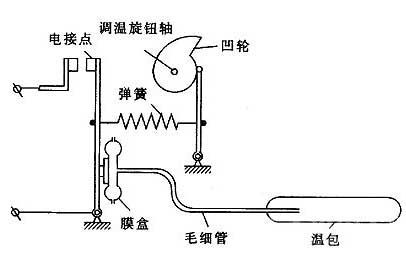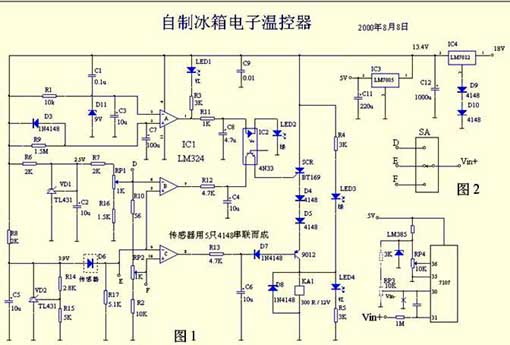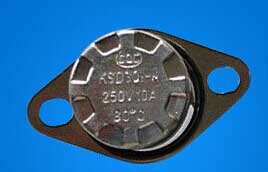How does the refrigerator thermostat work?
Generally, the temperature control knob of the refrigerator in the home usually has 0, 1, 2, 3, 4, 5, 6, and 7 positions. The higher the number, the lower the temperature in the freezer. Generally, we put it in the third gear in spring and autumn. In order to achieve the purpose of food preservation and power saving, we can hit 2 or 3 in summer and 4 or 5 in winter.
During the use of the refrigerator, its working time and power consumption are greatly affected by the ambient temperature. Therefore, we need to choose different gears to use in different seasons. Refrigerator thermostats should be turned on in low gear in summer and high in winter. When the ambient temperature is high in summer, it should be used in weak gears 2 and 3. When the ambient temperature is low in winter, it should be used in strong blocks 4,5.
You may be wondering why the temperature of the refrigerator is set relatively high in summer. This is because in summer, the ambient temperature is high (up to 30 ° C). If the temperature in the freezer is in the strong block (4, 5), it is below -18 ° C, and the temperature difference between the inside and outside is large, so it is difficult to reduce the temperature in the box by 1 ° C. Furthermore, the loss of cold air through the insulation of the cabinet and the door seal will also be accelerated, so that the long start-up time and short down time will cause the compressor to run at high temperatures for a long time, which consumes power and easily damages the compressor. If it is changed to the weak gear (2nd and 3rd gear) at this time, it will be found that the start-up time is significantly shorter, and the compressor wear is reduced, and the service life is extended. Therefore, the temperature control will be adjusted to weak when the summer is hot.
When the ambient temperature in winter is low, if you still adjust the thermostat to weak. Therefore, when the temperature difference between inside and outside is small, the compressor will not be easy to start. Refrigerators with a single refrigeration system may also experience thawing in the freezer compartment.
A general refrigerator uses a pressure temperature switch to maintain a constant temperature of the refrigerator. Below we introduce it to explain the working principle of the general pressure temperature control switch.
Refrigerator thermostat schematic diagram 1

The temperature adjustment knob and cam are used to set the average temperature of the refrigerator. In the closed temperature package, "wet saturated steam" coexisted with gas and liquid. Generally the refrigerant is methane or freon, because their boiling point is relatively low, it is easy to vaporize and expand when heated. The cap is connected to the capsule through a capillary tube. This capsule is made of special materials and is extremely flexible.
 The electrical contacts at the beginning of the lever are not closed. When the temperature rises, the saturated steam in the temperature pack expands when heated, and the pressure increases. Through the pressure transmission of the capillary, the capsule also expands.
The electrical contacts at the beginning of the lever are not closed. When the temperature rises, the saturated steam in the temperature pack expands when heated, and the pressure increases. Through the pressure transmission of the capillary, the capsule also expands.
Thereby, the lever is pushed counterclockwise to overcome the torque generated by the tension of the spring. When the temperature reaches a certain level, the contacts are closed, and the refrigerator compressor starts to work for cooling. When the temperature decreases, the saturated gas shrinks, the pressure decreases, the contacts open, and refrigeration stops. This cycle keeps the refrigerator temperature within a certain range and saves electricity.

According to the principle of thermal expansion and contraction of objects. Thermal expansion and contraction are common to objects, but the degree of thermal expansion and contraction varies from object to object. The two sides of the double gold sheet are conductors of different substances, and the double gold sheet is bent due to different degrees of expansion and contraction at varying temperatures, and the set contact or switch is made to start the set circuit (protection) to work.
Nowadays, most refrigerators use temperature-sensing tubes to detect the temperature. The liquid inside contains the liquid, which expands and contracts with the temperature, pushes the metal piece at one end, and switches the compressor on and off.
During the use of the refrigerator, its working time and power consumption are greatly affected by the ambient temperature. Therefore, we need to choose different gears to use in different seasons. Refrigerator thermostats should be turned on in low gear in summer and high in winter. When the ambient temperature is high in summer, it should be used in weak gears 2 and 3. When the ambient temperature is low in winter, it should be used in strong blocks 4,5.
You may be wondering why the temperature of the refrigerator is set relatively high in summer. This is because in summer, the ambient temperature is high (up to 30 ° C). If the temperature in the freezer is in the strong block (4, 5), it is below -18 ° C, and the temperature difference between the inside and outside is large, so it is difficult to reduce the temperature in the box by 1 ° C. Furthermore, the loss of cold air through the insulation of the cabinet and the door seal will also be accelerated, so that the long start-up time and short down time will cause the compressor to run at high temperatures for a long time, which consumes power and easily damages the compressor. If it is changed to the weak gear (2nd and 3rd gear) at this time, it will be found that the start-up time is significantly shorter, and the compressor wear is reduced, and the service life is extended. Therefore, the temperature control will be adjusted to weak when the summer is hot.
When the ambient temperature in winter is low, if you still adjust the thermostat to weak. Therefore, when the temperature difference between inside and outside is small, the compressor will not be easy to start. Refrigerators with a single refrigeration system may also experience thawing in the freezer compartment.
A general refrigerator uses a pressure temperature switch to maintain a constant temperature of the refrigerator. Below we introduce it to explain the working principle of the general pressure temperature control switch.
Refrigerator thermostat schematic diagram 1

The temperature adjustment knob and cam are used to set the average temperature of the refrigerator. In the closed temperature package, "wet saturated steam" coexisted with gas and liquid. Generally the refrigerant is methane or freon, because their boiling point is relatively low, it is easy to vaporize and expand when heated. The cap is connected to the capsule through a capillary tube. This capsule is made of special materials and is extremely flexible.

Thereby, the lever is pushed counterclockwise to overcome the torque generated by the tension of the spring. When the temperature reaches a certain level, the contacts are closed, and the refrigerator compressor starts to work for cooling. When the temperature decreases, the saturated gas shrinks, the pressure decreases, the contacts open, and refrigeration stops. This cycle keeps the refrigerator temperature within a certain range and saves electricity.
Refrigerator thermostat schematic diagram 2

According to the principle of thermal expansion and contraction of objects. Thermal expansion and contraction are common to objects, but the degree of thermal expansion and contraction varies from object to object. The two sides of the double gold sheet are conductors of different substances, and the double gold sheet is bent due to different degrees of expansion and contraction at varying temperatures, and the set contact or switch is made to start the set circuit (protection) to work.
Nowadays, most refrigerators use temperature-sensing tubes to detect the temperature. The liquid inside contains the liquid, which expands and contracts with the temperature, pushes the metal piece at one end, and switches the compressor on and off.
PREVIOUS:NONE
NEXT:The effect of anti-drying temperature control switch on electric kettle
NEXT:The effect of anti-drying temperature control switch on electric kettle





